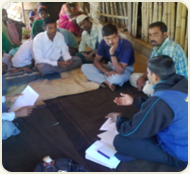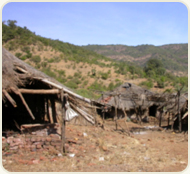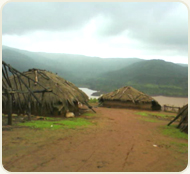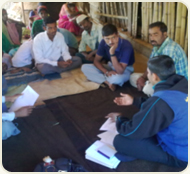|
Introducation of the Project |
The Katkari are a Primitive tribal group (PTG) of indigenous hunter gatherers who live in the Indian state of Maharashtra. Their ongoing survival is threatened by years of systemic exploitation, racial prejudice, abject poverty and loss of their traditional lands.
In Pune district Katkari is the only PTG’S identified mostly in the region of Sahyadri. This group is located in 9 different blocks (Taluka). According to the census of 2001 Total Katkari primitive tribe’s population is around 14091 in Pune District.
There are two sub groups of the community namely Dhor-Katkari and the Son –Katkari. This tribe is one of the most primitive tribes in Maharashtra. Most of the Katkari are the labors. Besides earning through daily wage labor they are known for hunting, fishing, collecting roots etc
In Velhe Taluka total kithara’s population is 1069. These “Katkari” communities do not have fixed and proper place to stay. They get settled wherever they find a place. These communities are extremely poor and live in very worse and unhygienic conditions. The percentage of consuming alcohol is very high in these communities.
Their basic occupation is fishing and labor work. Whatever they earn they spend on food and liquor. This shows how unsecured they are about their future.
This community does not have their own place. Due to this they could not have any kind of support from the Government. Government has plenty of Schemes for such communities but due unavailability of documents like Ration Card, Caste Certificate, Below Poverty Line Certificate etc. they are isolated. There is no Birth & Death record with Government of Katkari communities. Some cases are exceptions for these situations. These communities have never gone to the schools from their generations.
These communities tribal has been working, many work as a bounded laborer an institutionalized form of slavery that forces them to toil in brick works for extremely poor wages under sub-human conditions.
 |
This objective of the sector has organizing tribal people & sensitizing tribal community about their rights and responsibility.
To make coordination with various network, to development agencies, through capacity building of tribal with utilization of available resources.
Tribal people realize their problems and come together to solve it.
A survey was done in the beginning in some villages to understand the social-economically condition and situation of the tribal people. The findings of the survey also helped us to know about the various problems that they face due to their backwardness.
Till date we have completed survey in 32 villages of Velhe block. A total of 298 families were found to reside in these villages.
After establishing rapport with the villagers we have formed various SHG, village development committees and pressure groups. These groups were formed in order to organize them and and make them aware about various issues which can benefit them in the future.
Exposure visits was organized to “Shashwat Organisation” Ambegaon block, where the groups are working efficiently. This visit has motivated them to a great level.
Various session, workshop, training, camp and Melava etc have been organised for the tribal people.
We have established Creche ,Balwadi ,ALC to cater the needs of the tribal population.
|
Tribal Sector Work & Achievement Till Date: |
Status of Katkaries In Velhe Block
Educational status
There are no supporting documents with the government which can focus the literacy rate among the tribes. It was only after our survey work and data analysis that we found that the literacy rate among the Katkari is only 22%. The migratory nature of the tribe in search of jobs hampers the unremitting flow in education of the tribes
Economical status
Economically this tribe is poor and backward, still relying on their traditional occupation for day to day needs. They continue to live in isolation and practice primitive or no agricultural practice.
Most of them are still in food gathering and seasonal occupation stage which make them almost a stagnant population.
Usually in Velhe 4 different occupational categories were associated with the Katkari
| |
Daily wages |
|
Daily wages, agricultural labor work. |
| |
Daily wages, fishing |
|
Daily wages, labor work and fishing. |
Health status
Majority of the Katkari live in remote, isolated hilly areas far from civilization. This contributes to their poor health status. Due to inadequate Health infrastructure they have complicated Health problems.
Deficiency of essential components in diet leads to malnutrition, protein calorie malnutrition and micronutrient deficiencies (vit A, iron and iodine) in them. Excess consumption of alcohol, however, the switch over to commercially available liquor is likely to be a major threat. To add upon they are trapped with various superstitions particularly related to health problems.
Lack of maternal and child health services among the hilly tribal areas lead to high fertility, high maternal and infant mortality rates.
These tribes have strong belief on natural resources. The health facilities that are provided by the government do not reach the people. Because of illiteracy and lack of trust on modern medicine, the number of beneficiaries of these programs is very low.
As Reproductive and Child Health is of prime concern, the percentage of immunization as per Medical Officer of PHC Panshet is below 10 %. And if health worker reaches them, they are not ready for any kind of immunization. This reason is sufficient to increased level of morbidity and mortality in Katkari populations. communicable diseases like T.B. and skin diseases are most common in this people. They are also facing the water borne and air borne diseases several in rainy seasons. The women populations facing tremendous gynaec problems.
Summary of Awakening Jagriti Intervention
Since the year 2005 Intervida has started working with these communities. Initially we conducted survey of these tribes in Velhe block. Till date we have surveyed 32 villages (298 families) and collected basic information about these tribes.
We have work with these communities in various aspects following are the details;
Balwadi
We have started Pr- Primary Schools (Balwadi) in Velhe block since 2006 onwards, till date we have total 10 Balwadi in different villages from Velhe. Total 86 children are enrolled in these Balwadi’s. We are also providing Nutrition to these children.
Crèche
We have introduced this concept from 2008 onwards. It was observed that due to the changing place of work and distance many parents for this community cannot take proper care of these children who belongs to 1 to 3 years age group. Also the malnourishment rate in these children was found high.
We have started crèche to bring all these children in one particular place where one person from the same community will look after them whole day till their parents came. In crèche we are providing them Nutrition also. Last year we have started total 3 crèche at malavali, shirkoli and Kopatewadi Villages.
Adult Literacy Classes
Considering Literacy rate of this community we have started ALC from 2008 onwards. Presently we have 2 ALC at sonde Mathana and Malavali Villages. And total 42 beneficiaries are involved in this ALC.
 |
Village Health Guide (VHG)
Creating awareness amongst this community also to decrease the morbidity and mortality rate we have formed VHG‘s in this communities. Through the VHG’S we are giving Medicine as well as supportive nutrition to the pregnant and lactating women.
Presently we are having 5 VHG’S in 6 Villages from Velhe at Mose, Shirkoli, Malavali, Katakariwasti, Sonde Mathana, and Khoptewadi. Through this we are covering around 705 tribal beneficiaries and 141 families.
Insurance Schemes
We have submitted total 136 beneficiaries’ Health Insurance schemes proposal at district tribal development office on 2005. And this entire proposal has been sanctioned by the Govt.
|
Community Particpation & Doccumentation Work |
 |
Meeting with Jadhavwadi Villagers regarding the SHG formation.
Meeting with Sonde Mathana Tribal People regarding Caste Certificate Process. |
Self Help Groups
For the further development of this community we have started doing Formation of SHG’’s from 2005 onwards. Till date we have formed around 15 SHG from 8 Villages. Total 126 members are involved in this SHG’s. Within these 12 groups 7 groups are Female SHG’s, 5 groups are male SHG and 2 groups are Youth Groups and 1 is Mix Group.
Caste Certificates
For availing this particular important document first referral letters has been taken form the different people from the villages like Sarpanch (Village Leader), polic patil, Gramsevak, Talati and circle officer.
With the proposal of cast certificate this document were submitted to the Tahsil office in 2005. Total 50 cast certificates were avail to the Katkari beneficiaries from velhe.
Rationing Card
We are taking follow up of these particular documents for Kathakari people from 2005. We submitted around 100 rationing card proposal in Tahsil office on 2008. Out of those only 12 beneficiaries has got this Document.
Most of the Katkari families form Velhe are not having basic documents like caste Certificates, Rationing card etc. these documents are very important for them to get different schemes from Govt. for availing these certificates joint survey from Tribal Development inspector and circle officer from Tahasil is essential.
Preparations-
Accordingly we have visited to different villages where this community people are staying. They were informed about the documentation camp regarding caste certificate and its process. Also documentation forms were distributed to families.
Different villages level govt. authority person were informed like police patil, Talathi, Gramsevek, etc. to attend the camp.
Details of camp –
As per the Planning on 6th of Nov. 2009 documentation camp was organized at velhe. For the program local leader from Panchayat samittee and Block development Officer and police inspector were invited for addressing the people.
One tribal person selected as a member of Dashakata Committee of block level. MLA is the president of this committee and Tahsildar is the secretary of this committee. This committee has been working on the rationing system.
One Pressure group formed in Velhe block. Now that group has been working with tribal people to create awareness on various issues.
Joint survey done of 187 tribal people of Velhe block. This survey done by the Inspector of Tribal Development Project office and Tahsil office Velhe. This survey will helpful for get the Caste Certificate.
Government Scheme- Velhe tribal people has been aware about the various scheme, now they are visiting to the various government offices for the getting the scheme. for example Gas unit,Anotoday Anna Yojana, Khawati Karj Yojana. etc.
 |
 |
 |
 |
| Hut of the Tribal People. |
Documentation work: - Caste Certificate process format distribution to Katkari Vasti
|